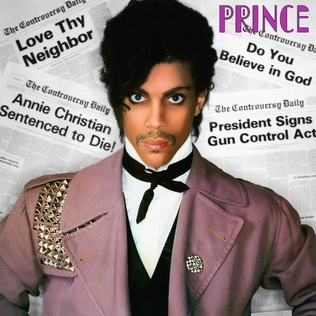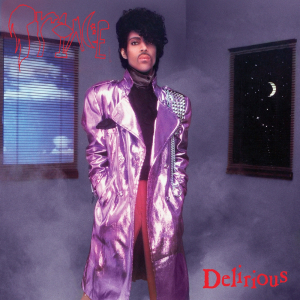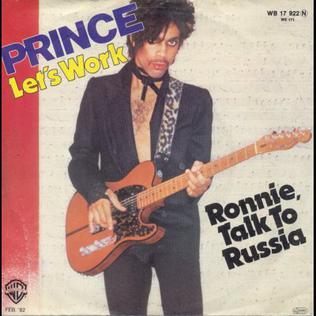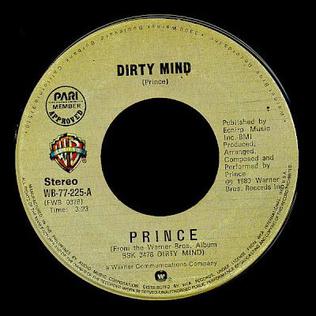
Controversy is the fourth studio album by the American singer-songwriter and musician Prince, released on October 14, 1981, by Warner Bros. Records. With the exception of one track, it was written and produced entirely by Prince. He also performed most of the instruments on its recording.

Around the World in a Day is the seventh studio album by American recording artist Prince, and the third release on which his backing band the Revolution is billed. It was released on April 22, 1985, by Paisley Park Records and Warner Bros. Records. Departing somewhat from the commercial sound of his previous release, the massively successful Purple Rain (1984), the album instead saw Prince experimenting with psychedelic styles and more opulent textures. In compliance with Prince's wishes, the record company released the album with minimal publicity, withholding accompanying singles until almost a month after the album's release.

Ice Cream Castle is a 1984 album by The Time. Their third album, it consists of six tracks in the funk-pop or ballad genre, and it was produced and arranged by Prince as "The Starr ★ Company".

"Let's Go Crazy" is a 1984 song by Prince and The Revolution, from the album Purple Rain. It is the opening track on both the album and the film Purple Rain. "Let's Go Crazy" was one of Prince's most popular songs, and was a staple for concert performances, often segueing into other hits. When released as a single, the song became Prince's second number-one hit on the Billboard Hot 100, and also topped the two component charts, the Hot R&B/Hip-Hop Songs and Hot Dance Club Play charts, as well as becoming a UK Top 10 hit. The B-side was the lyrically controversial "Erotic City". In the UK, the song was released as a double A-side with "Take Me with U".

"Take Me with U" is a song by Prince and the Revolution, and the final US single released from their album, Purple Rain (1984).

"Delirious" is a song by American musician Prince, from his fifth studio album album, 1999 (1982). It was the album's third single, and Prince's second Top 10 hit, reaching No. 8 in the US during the fall of 1983. The success of the single was boosted by the runaway success of the previous single, "Little Red Corvette", and also because DJs often played the first three album tracks in sequence, which just happened to be the order of the singles released from the album.

"Controversy" is a song by American musician Prince, the lead single and title track to his 1981 album. The song addresses speculation about Prince at the time such as his sexuality, gender, religion, and racial background, and how he could not understand the curiosity surrounding him.

"Let's Pretend We're Married" is a song by American musician Prince from his 1982 album 1999. It was the final US single from the album and peaked at number 52 in the US.

"Uptown" is the lead single from Prince's third album, Dirty Mind. Beginning with a lone drum intro, the track explodes into the keyboards of the chorus. The verses feature a more prominent funk guitar. The song breaks down to a more instrumental section toward the end that mainly consists of guitar, bass and drums with an occasional keyboard riff. The minimalist style of the song is representative of most of the Dirty Mind album. The song addresses the Uptown neighborhood of Minneapolis that was the city's hang-out spot for artists.

"Let's Work" is a song by Prince, released as the second single from his 1981 album Controversy. The song originates from a dance called "the Rock" that local kids were doing at the time in Minneapolis. Prince responded quickly with a track called "Let's Rock", and wished to quickly release it as a single. Warner Bros. refused, and a disappointed Prince did not include the song on Controversy, saying the phase had passed. Instead, the song was updated with new lyrics and possibly new music and became "Let's Work"—one of his most popular dance numbers.

"Why You Wanna Treat Me So Bad?" is the US follow-up single to Prince's first big hit, "I Wanna Be Your Lover". It is also Prince's first rock and roll-inspired single release. It did not make the top 40 of the Billboard Hot 100 charts, although it did reach #13 on the R&B Singles charts. The lyrics explore a relationship with a cruel lover. The song prominently features guitar and bass, with the keyboard featured in a less prominent role. A highlight of the song is a soaring guitar solo at the end, played by Prince himself.

"Dirty Mind" is the follow-up single in the US, and title track to Prince's third album, released in 1980. The song is built around a keyboard riff created by Doctor Fink, which dominates the song. The demo-like song lacks a chorus, and is a stark departure of the smooth R&B sound of Prince's first two albums. The lyrics concern sexual thoughts, which are fairly representative of the other songs from the album. The single's B-side is the ballad "When We're Dancing Close and Slow", from the previous year's Prince. "Dirty Mind" reached number sixty-five on the soul chart. Along with the tracks "Uptown" and "Head", "Dirty Mind" reached number five on the dance chart.

"Do Me, Baby" is a 1981 ballad performed by Prince, from his fourth album, Controversy. Although Prince is credited as the sole writer for the song, his former bassist and childhood friend André Cymone claimed to have written it. It was released as the third and final US single from the album. It was later included on his 1993 compilation The Hits/The B-Sides. In 1986, the song was notably covered by R&B singer Meli'sa Morgan. It was featured in one of the opening scenes of the 2007 film Rush Hour 3, with Chris Tucker's character singing along while listening to it on his headphones and simultaneously directing traffic with the dance sequences of Michael Jackson.
"Darling Nikki" is a song produced, arranged, composed, and performed by American musician Prince, originally released on his sixth studio album Purple Rain (1984). Though the song was not released as a single, it gained wide notoriety after Tipper Gore pointed out its sexual lyrics—in particular an explicit reference to female masturbation—and was partly responsible for the creation of the infamous Parental Advisory sticker. The song tells the story of a "sex fiend" named Nikki who seduces the singer.
"When You Were Mine" is a song written and released by Prince on his 1980 album, Dirty Mind. Though not released as a single, the song received a promotional 12" release. "When You Were Mine" was later the B-side for Prince's "Controversy" single in 1981.

"Ice Cream Castles" is the opening track from the Time's third album, Ice Cream Castle. The song was composed by Prince and Morris Day, with Prince writing the lyrics after recording the instrumental tracks. Day provided drums and lead vocals, while Jesse Johnson played electric guitars on the recording. Prince played all the other instruments.
"Gigolos Get Lonely Too" is the fifth track from the Time's six-song album, What Time Is It?. One of the first songs recorded for the album, it was produced, arranged, composed and performed by Prince with Morris Day later adding his lead vocals.

"Girl" was the final single released from the Time's debut album. Like most of the album, the song was recorded in Prince's home studio in April 1981, and was produced, arranged, composed and performed by Prince with Morris Day later adding his lead vocals. The single reached number 49 on the U.S. R&B singles chart.

"Cool" is a song by The Time, released as the second single from their eponymous debut album. Like most of the album, the song was recorded in Prince's home studio in April 1981, and was produced, arranged, and performed by Prince with Morris Day later adding his lead vocals. The song was co-written with Revolution guitarist Dez Dickerson and contains background vocals by keyboardist Lisa Coleman, however both were uncredited.

"Get It Up" is the debut single by American funk rock band the Time, from their 1981 self-titled debut album. Like most of the album, the song was recorded in Prince's home studio in April 1981, and was produced, arranged, composed and performed by Prince with Morris Day later adding his lead vocals. Revolution keyboardist Doctor Fink provided synth solos on the track, uncredited.

















